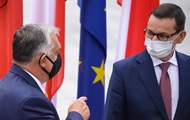The European Court has started a trial against Poland, the Hungarian Prime Minister refuses to change policy at the request of the European Union. And Slovenia, it seems, is going to follow the example of its eastern neighbor.
The European Union has opened a lawsuit against Poland over a long-standing scandal with the judicial system, Hungary refuses to change its policy towards LGBT and migrants at the request of the EU. Meanwhile, Ljubljana is playing with fire, oppressing freedom of speech. What is happening in the two neighboring countries of Ukraine, as well as in Slovenia, says Korrespondent.net.
Disputes over the Polish judicial system
Brussels has launched a lawsuit against Poland over the EU rule of law scandal in the country, writes Euronews.
In October, Poland’s Constitutional Tribunal ruled that the country’s membership in the European Union does not give EU courts the highest legal authority. The decision sparked anger in Brussels and further undermined Warsaw’s already difficult relationship with EU leaders.
The day before, the European Commission said it had “serious concerns” about the ruling and said it had started “an investigation procedure.” Brussels accuses Warsaw of violating European agreements and depriving citizens of the “right to effective judicial protection” in Polish courts.
“The Commission seriously doubts the independence and impartiality of the Constitutional Court,” the statement said. Poland now has two months to respond.
In recent years, the Polish authorities have passed a series of laws to revise the judiciary, allowing the government to fire anti-reform judges, lowering the retirement age for Supreme Court justices, and creating a controversial Supreme Court chamber for disciplinary action.
The Polish government argues that reforms were necessary to streamline the judicial system and eliminate the remnants of the communist regime. Critics argue that these measures have effectively deprived the judiciary of the independence that is the backbone of democracy.
The European Court of Justice – the highest instance of the EU – in July ruled to suspend the creation of the disciplinary chamber, as well as the action of the decisions already taken to lift judicial immunity.
The December 22 ruling said that “Poland did not take the necessary steps to fully comply” with the European Court’s July injunction.
Polish Prime Minister Mateusz Morawiecki immediately denied all charges, saying that the court “not only meets all the criteria for independence, but is also a constitutional tribunal that guards the constitution and ensures that it remains the supreme law of the Republic of Poland.”
And Polish Justice Minister Zbigniew Ziobro said that Brussels’ actions are aimed at transforming the EU into a “federal state” in which the sovereignty of national states will suffer. “The logic of the current position of the European Commission is obvious. We are talking about the destabilization of the Polish state and Polish democracy,” Ziobro said.
In October, the European Court of Justice imposed a fine of one million euros per day on Warsaw for failing to suspend the regulations regarding its disciplinary chamber in accordance with a court ruling.
LGBT people and migrants in Hungary
Hungarian Prime Minister Viktor Orban said that Budapest will not change its migration policy, despite the recent ruling of the European Court of Justice that found it contrary to EU law.
A ruling issued last year by the EU’s highest court found that Hungary did not comply with EU laws by detaining people entering the country without permission, denying them the right to apply for asylum and keeping them in “transit zones” along Hungary’s southern border with Serbia.
During his press conference in Budapest, right-wing populist Orban insisted that Hungary will continue its migration policy and that “it doesn’t matter what the European Court has ruled – Hungary must continue to defend its borders.”
“We have decided that we will not do anything to change the way of protecting the border,” the prime minister said. “We will not let anyone in.”
Failure to comply with the European Court’s decision could lead to the imposition of heavy fines on Hungary by the EU, as was the case with Poland. This will be the next step after the sanctions, due to which Budapest lost billions of euros from the EU.
Thus, the European Commission canceled the payment of several billion euros intended for Hungary as part of the fight against COVID-19 due to inadequate anti-corruption measures on the issue of public spending. Orban called the move “political blackmail” and said that the EU has no right to take away the money owed to Hungary.
“This whole procedure is the most brutal sabotage of the unity and the future of the European Union,” he said. “This is what destroys the EU. I have never seen a policy more irresponsible than on this issue.
Earlier in Brussels criticized the Hungarian law prohibiting “advertising of homosexuality” and gender reassignment for minors. The document is directed against educational projects that reveal the topic of homosexuality, and advertisements of large companies demonstrating solidarity with LGBT people.
The EU stated that the law contradicts international human rights standards and does not provide children with access to objective and impartial information about gender identity and sexual orientation. For the adoption of this law, Hungary was also threatened with a reduction in payments.
And Slovenia there too?
The European Parliament recently voted in favor of a resolution, which for the first time criticizes the small Balkan state for its attitude to EU values.
MEPs said they were “deeply concerned about the level of public debate, the climate of hostility, mistrust and deep polarization in Slovenia, which has undermined confidence in and among government agencies.”
Brussels is also concerned about the issue of freedom of the media in the country and delays in the appointment of delegates to the European Prosecutor’s Office.
Slovenian Prime Minister Janez Jansa, Orban’s ally, is a member of the influential conservative group of the European People’s Party in the European Parliament. Therefore, the EPP deputies either voted against the resolution or abstained.
Critics say the right-wing political group is essentially repeating what it once did to Orban, which is turning a blind eye to a deviation from the rule of law in its own ranks.
They also draw parallels between Orban’s attempts to control the media and attacks on press freedom reported in Slovenia when Janša insulted journalists.
However, according to Freedom House, Slovenia still has a high 95% score in the 2021 Freedom Index – up from 69% in Hungary, the only EU country that human rights activists describe as “partially free” rather than “free.” …
“In March 2020, we had a new right-wing government. And since then, we have faced a number of challenges regarding core principles, including the rule of law.” said Euronews Marko Milosavljevic, professor of journalism at the University of Ljubljana. He notes increased pressure on free speech and many other civil liberties.
MEPs point out, in particular, problems with funding the Slovenian news agency STA. Milosavljevic compares such actions to “the government’s attempts to control the public broadcaster, as was the case, for example, in Hungary.”
He said that the manager and editor-in-chief of Slovenian television, as well as several other key editors, had resigned due to the “radical and dangerous plans of the new leadership.”
Brussels sent a deputy mission to Ljubljana to assess the situation on the spot. Janos was furious at this and called some MPs “Soros puppets” in a tweet that was later deleted.
Another area of concern for the EU is also related to the judicial system, especially regarding appointments to the European Prosecutor’s Office. The Slovenian government did not want to approve the candidacy for a long time, and after the approval it turned out that the appointment was of a temporary nature – this is a violation of European legislation.
Some analysts see the latest events in Slovenia as another symptom of a new Iron Curtain in Europe.
News from Correspondent.net in Telegram. Subscribe to our channel https://t.me/korrespondentnet
– .


